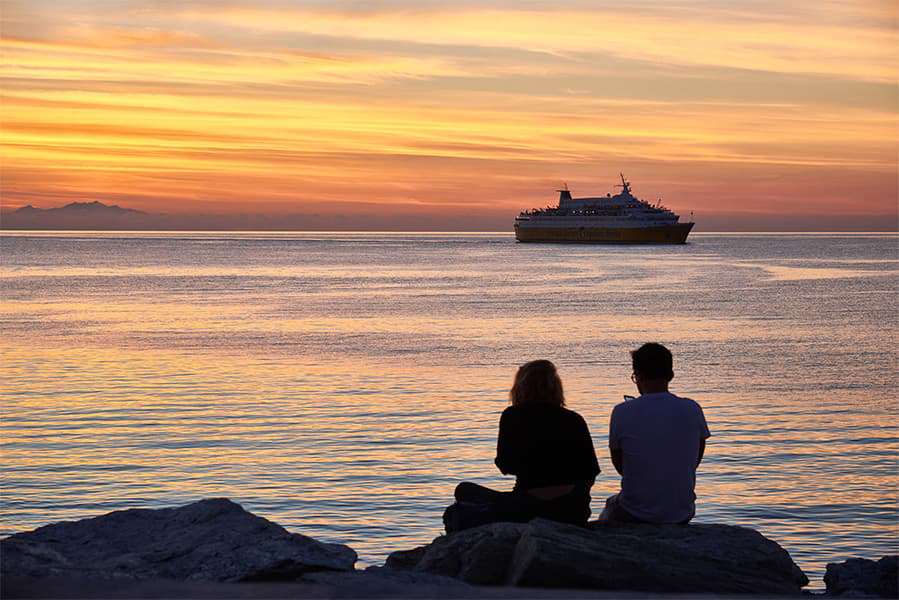Kiel - Klaipeda
Ferries to Lithuania
Kiel - Klaipeda
Ferries to Lithuania

Depending on the season their are about 6 weekly sailings between Kiel and Klaipeda. DFDS Seaways provides the ferry from Kiel to Klaipeda. Kiel Klaipeda ferries cost between $143 and $1044, depending on ticket details. Prices exclude any service fees. Ferry timetables change seasonally, use our Deal Finder to get tickets, pricing, schedules and availability.
The earliest Kiel Klaipeda ferry typically departs Kiel at about 20:00 and the last ferry usually leaves at 23:59.
Ferries from Kiel to Klaipeda sail in around 20 hours 30 minutes. The fastest ferry is approximately 20 hours. Ferry duration can vary by ferry provider and can be impacted by weather conditions.
There is 6 weekly sailings from Kiel to Klaipeda provided by DFDS Seaways. Timetables can change from season to season.
The price of a ferry from Kiel to Klaipeda typically range between $143* and $1044*. On average the Kiel Klaipeda ferry is $486*. The cheapest Kiel Klaipeda ferry prices start from $143*. The average price for a foot passenger is $204*. The average price for a car is $593*.
Pricing will vary depending on number of passengers, vehicle type, route and sailing times. Pricing is taken from searches over last 30 days and exclusive of service fees, last updated December 25.
The distance between Kiel to Klaipeda is approximately 766 miles (1232km) or 665 nautical miles.
Yes, Kiel Klaipeda ferries allow cars onboard with DFDS Seaways between Kiel and Klaipeda. To view car ferry tickets and prices between Kiel and Klaipeda use our Deal Finder.
DFDS Seaways allow foot passengers on Kiel Klaipeda ferries.
DFDS Seaways allow pets on ferries from Kiel to Klaipeda. Please also note that your pet may have to stay in the vehicle during the journey.
More routes than anyone else.

Compare fares, times & routes in one place.
Change plans easily with flexi tickets.

Book e-tickets & manage trips in-app.
Live ship tracking & real-time updates.

Top-rated customer support when you need it.
| Kiel - Klaipeda Ferry Route Summary | ||
|---|---|---|
| Departure Country | Germany | |
| Destination Country | Lithuania | |
| No. of Operators | 1 | |
| Operators | DFDS Seaways | |
| Average Price | $486 | |
| Average Daily Sailings | 1 | |
| Average Weekly Sailings | 6 | |
| Average Sailing Duration | 20 h 30 m | |
| Fastest Sailing Duration | 20 h | |
| First Ferry | 20:00 | |
| Last Ferry | 23:59 | |
| Distance | 665 Nautical Miles | |
* Prices subject to change, pricing is taken from last 30 days, last updated 1 December 2025.
The city of Kiel is the capital and most populous city in the northern German state of Schleswig-Holstein, and is around 90 km to the north of Hamburg. The city's port has become an important port for both commercial and pleasure vessels almost certainly because of its location on the south western shore of the Baltic Sea and to the south east of the Jutland Peninsula in Denmark. Kiel Week, which the city hosts annually, is known the world over and comprises of a number of international regattas. The city was also the host to the sailing events at the 1936 and 1972 Summer Olympics.
The 13th century St Nicholas' Church (Nikolaikirch) is the oldest building in the city which has a sculpture by Ernst Barlach in front of it. The city, which has a number of parks and lakes for visitors to enjoy, especially if they are seeking some peace and tranquillity, is the main shopping destination for the region. Holstenstrabe in the city is one of the longest shopping streets in Germany.
Kiel's busy port has around 50 crossings per week to destinations in Sweden, Denmark and Lithuania. The port has three passenger terminals with a good level of facilities including a number of shops and places to eat.
The city and port of Klaipeda is Lithuania's only ort and therefore its history and prosperity is inextricably linked to the sea. Popular attractions in the city include the summer Sea Festival and the biennial Tall Ships regattas and the sea museum. The city also has a sea faculty at the local university and is also home to major stevedoring companies. Ever since its establishment by the Teutonic Knights (as Memelburg) in 1252 the city was distinct from the rest of Lithuania. It was ruled by Germans together with the rest of Lithuania Minor. Even its Lithuanian name “Klaipeda”, first mentioned in the 16th century, is believed to mean “Bread eater”.
Visitors to the city should note that it is quite a windy city that experiences many storms during the year which are characterised by sea breezes from April to September and gales in the autumn and winter. It is also not uncommon for snow to fall during the autumn and winter months and can, on occasions, paralyze the city but fortunately the port remains mainly frost free.
Klaipeda's ferry port is located in the south-west part of the city and offers passengers services to Kiel and Karlshamn.